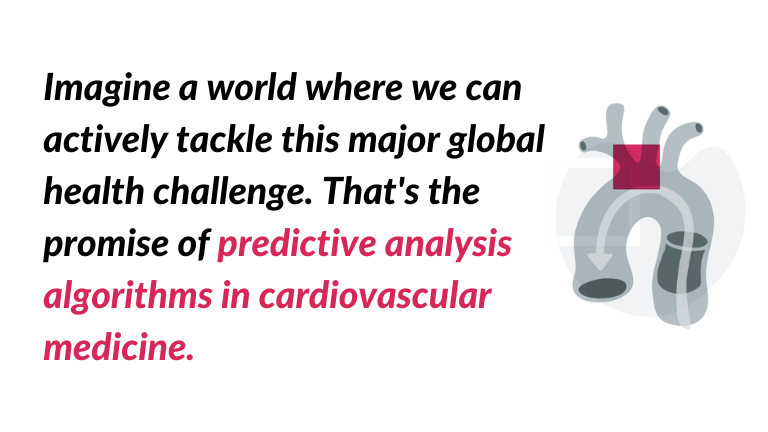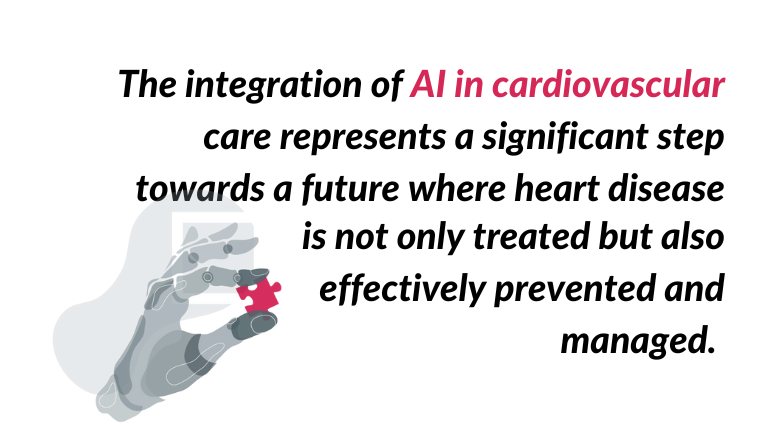Predictive analysis algorithms in cardiovascular diseases
Despite medical advancements, cardiovascular diseases remain a global concern. This issue is additionally compounded by an aging population as well as the current and projected shortage of clinicians. Heart disease and other cardiovascular diseases account for one-third of all deaths worldwide 18 million [1]. The growing need for early detection and treatment improvement is precisely the reason why predictive analytics algorithms are being developed and gradually implemented in everyday medical practice. These algorithms enable doctors to detect cardiovascular disease faster, ultimately leading to better patient outcomes and longer patient lives.
AI is changing the face of the fight against heart disease
The fight against heart disease has historically been reactive, with the patient waiting for symptoms to appear before their disease was detected and the doctor could try to treat it. But imagine a world where we can actively tackle this major global health challenge. That’s the promise of predictive analysis algorithms in cardiovascular medicine. Leveraging complex AI models and vast datasets, these algorithms analyze individual health data (family history, genetics, lifestyle habits) to predict heart disease risk. Armed with this early warning system, patients and doctors can then proactively take preventive action and tailor interventions to each patient’s specific needs, potentially preventing serious health problems entirely.
AI shows great potential in a clinical setting to accelerate the diagnosis and treatment of cardiovascular diseases. These diseases include heart failure, atrial fibrillation, and a range of others. In a clinical setting, AI can accelerate the diagnosis and treatment of various cardiovascular diseases (CVD) like heart failure, atrial fibrillation, and valvular heart disease. It increases the effectiveness of auxiliary tools, stratification and typing of diseases, and prediction of treatment outcomes [2].
Predictive medical algorithms shift the focus from reactive therapy to proactive prevention. It is the prevention of heart disease that plays the biggest role in the creation and development of predictive algorithms. Certain solutions on the market allow you to detect a heart attack early even before symptoms appear, wearables that monitor your heart health in real-time, and personalized treatment plans tailored to your unique genetic makeup. This is a potential emerging reality in the field of cardiovascular medicine, driven by the power of artificial intelligence.

Opportunities for AI predictive analysis algorithms in cardiovascular care
However, predictive algorithms have more power than just risk assessment. In addition to analysing medical scans and spotting hidden patterns in patient data, these advanced systems can also predict potential side effects of surgeries or specific procedures. With this increased degree of information, individual treatment regimens can be created, facilitating the least invasive and most effective course of care for each patient.
The future holds a promising shift: heart disease transforming from a frightening foe to a preventable condition. This hopeful vision gains momentum thanks to the transformative power of AI in cardiovascular care. A report by the American College of Cardiology, titled “Artificial Intelligence in Cardiovascular Disease: A Primer for Clinicians,” highlights the multifaceted impact of AI, from early risk detection and prediction to personalized treatment plans and optimized procedures [3].
AI shines in analysing vast patient data – medical history, genes, and lifestyle habits. Consequently, it can identify subtle patterns and predict cardiovascular risk with impressive accuracy. This advantage translates to an early warning system for patients. Years before symptoms might appear, preventative action can be taken, giving patients a crucial head start in managing their health. In addition, AI-powered medical imaging tools can analyze medical scans with superhuman precision, uncovering hidden abnormalities that might otherwise go unnoticed. This increased diagnostic capacity leads to earlier and more targeted interventions, potentially saving lives and improving long-term outcomes.
Custom predictive cardiovascular treatment plans
Leveraging patient data, AI algorithms create personalized treatment plans. Analysing individual risk factors and past treatment responses, AI recommends the most effective, least invasive options for each patient. This tailored approach not only improves clinical outcomes but also minimizes side effects and enhances patient satisfaction. Furthermore, AI assists surgeons by optimizing procedures, simulating scenarios, and providing real-time guidance for optimal results.
AI in cardiovascular care is revolutionizing heart disease prevention, management, and treatment. Research fuels breakthroughs, bringing hope and better health to millions worldwide.

Responsible use of ML prediction in cardiovascular diseases
While AI holds great promise when it comes to revolutionizing cardiovascular medicine, responsible deployment remains crucial. We need to make sure that algorithms are trained on different datasets to avoid bias, prioritize patient privacy and data security, and maintain transparency in decision-making. In addition, human expertise should remain in the spotlight, and AI should act as a powerful tool to assist rather than replace the judgment of doctors. With responsible development and deployment, AI can truly transform cardiovascular care, promoting equitable access to personalized prevention, diagnosis, and treatment, ultimately saving lives and improving patient outcomes.
Predictive analytics in medical algorithms development are changing the face of the fight against heart disease by shifting the focus from reactive treatment to proactive prevention. This paradigm shift, driven by the power of artificial intelligence, holds great hope for a healthier future.
Predictive algorithms are transforming the field of cardiovascular medicine and providing a brighter future for millions of people around the world by enabling early detection and personalized care.
Prediction in the cardiovascular field – summary
It is worth noting that despite the significant development of predictive algorithms in the detection of heart disease, there is still a problem with too little data. Many diseases have different backgrounds and origins, and their symptoms can mimic other conditions. Therefore, despite the great optimism of AI experts, more research is needed. It is worth focusing primarily on increasing the amount and variety of data used to train algorithms. Larger and more diverse datasets will provide better precision and versatility for predictive analysis algorithms.